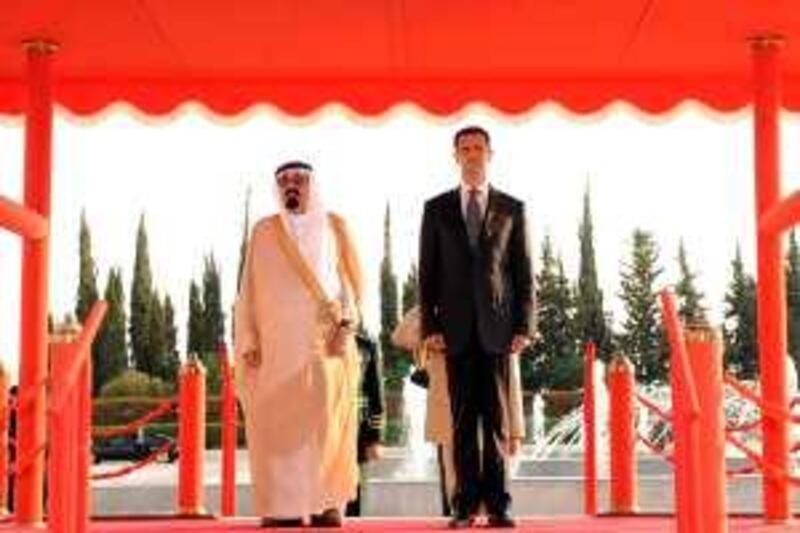Damascus // The trade in olive oil and ceramics between Riyadh and Damascus may not be the most critical issue in the Middle East, but it serves as a barometer for the changing political climate in the region. This year import taxes were in place on Saudi-made ceramics being sold in Syria. In similar fashion, the price of Syrian-produced olive oil on supermarket shelves in Saudi Arabia included a hefty import tariff.
The levying of such taxes would be unremarkable but for the fact that Damascus and Riyadh are both members of the Greater Arab Free Trade Area (Gafta) and had, as a result, agreed years earlier not to tax imports and exports between themselves and other Arab states. With the two countries at loggerheads over a series of political issues early this year, Syria felt little compulsion to honour that particular part of the Gafta deal, preferring instead to protect its domestic ceramics industry against Saudi competition.
Saudi Arabia responded in kind, putting a tariff of about 20 per cent on Syrian oil. Although far short of economic war, the tit-for-tat flouting of trade rules symbolised the frostiness that had characterised relations between Riyadh and Damascus since 2005. Officially, business links between the countries were never affected by the political fallout that followed the assassination of Rafik Hariri, a former Lebanese prime minister, in February 2005. Syria denied a role in the murder, but Riyadh suspected it of involvement and a dangerous battle for influence over Lebanon openly divided the two.
That contest was further complicated by Syria's closeness to Iran and Saudi Arabia's own concerns about Iran's growing regional power. A proxy war of sorts, between Iran and Syria and the United States and Saudi Arabia, developed in Beirut. A crisis point was reached last year when Riyadh withdrew its ambassador to Damascus and snubbed the 2008 Arab League meeting, hosted at the time by Syria. Still Saudi Arabia remained the largest single Arab investor in Syria, a position embodied by the huge US$100 million (Dh367m) Saudi-owned Four Seasons hotel that towers over Damascus. According to unofficial figures, the $750m of annual Saudi investment in Syria for 2007 grew to $1 billion in 2009.
However, some major Saudi investors either scaled back their involvement or decided not to follow through on expansion plans. A manager with a leading Saudi construction firm said, on condition of anonymity, that as a result of the feud dozens of companies froze investments or mothballed projects already underway in Syria. That meant the additional foreign capital so desperately needed by Damascus - billions of dollars over the coming decade if the economy is to remain afloat - did not materialise.
Ostensibly, this has now changed. King Abdullah of Saudi Arabia met Bashar Assad, the president of Syria, last month, re-establishing diplomatic relations. In the latest step, Mahdi Dakhlallah was sworn in as the new Syrian ambassador to the kingdom on October 25. And the tax war over ceramics and olive oil has ended, the tariffs abolished - a small, yet concrete symbol of improved ties between Syria and Saudi.
"With the economic reforms that Syria has been making to liberalise banking and money flows, and with the current good relations, we expect Saudi Arabian investment here to increase," said Feras Hadad, a Damascus economic analyst. "In the end, business and trade can win out over politics." Syrian confidence in renewed ties, coupled with continued improvements in the relationship with Turkey - another major political and economic ally - may have given Damascus the strength to last month postpone signing a long-delayed EU free-trade partnership deal. Syria is apparently reassessing the wisdom of the move.
There are lingering concerns that, although ties have improved, Syria and Saudi have not overcome all of their problems or made firm decisions about their joint futures. "I still don't see a clear strategy for the future between Saudi Arabia and Syria," said Mazen Bilal, a Syrian commentator. "All sides are waiting to see what is going to happen. The ongoing Iran nuclear crisis is now shifting to a different point, but no one is sure exactly where that is going, or what moves will have to be made in their best interest."
psands@thenational.ae





